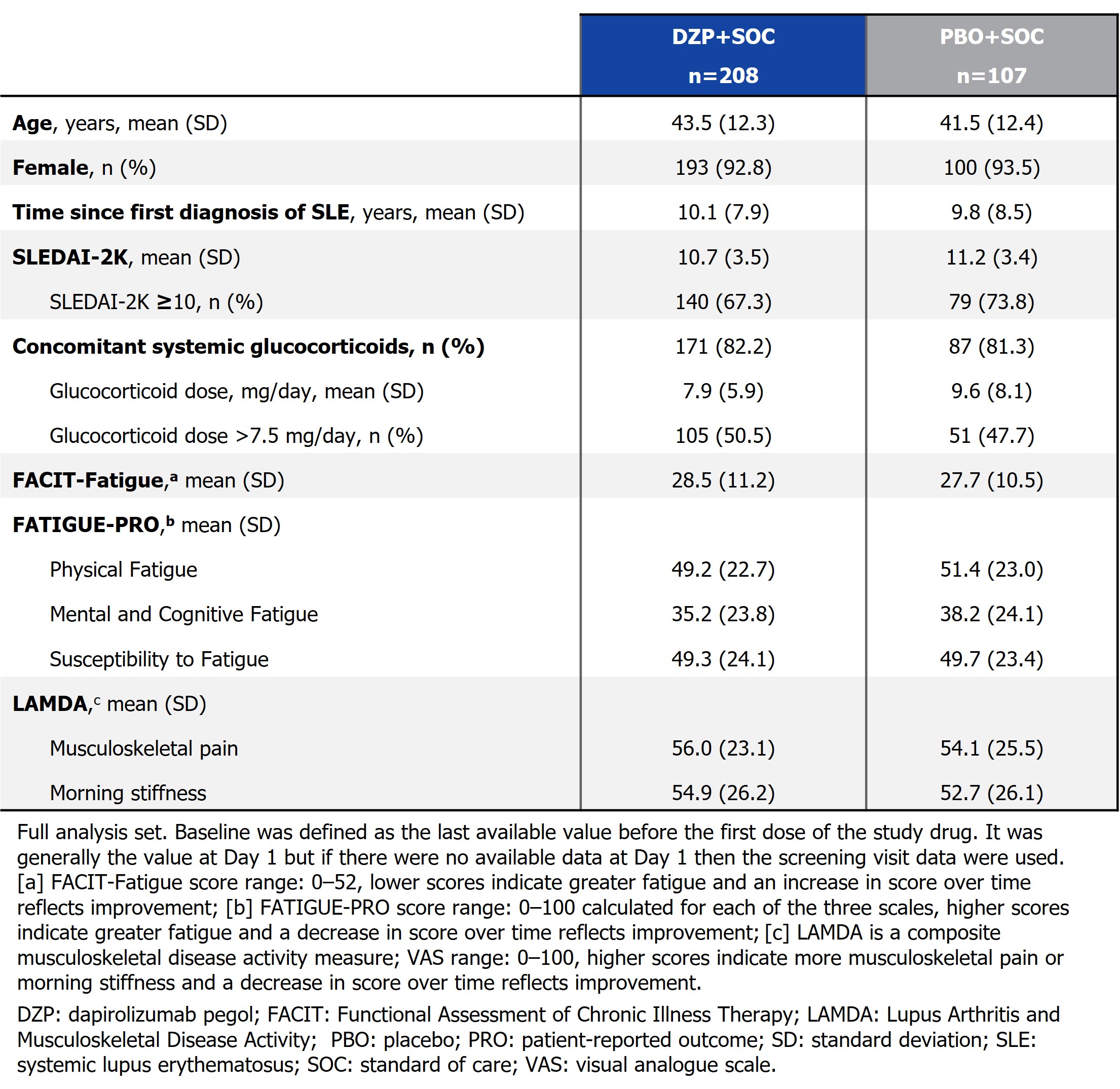Session Information
Session Type: Poster Session A
Session Time: 10:30AM-12:30PM
Background/Purpose: Fatigue, musculoskeletal pain, and joint stiffness are common manifestations of SLE, presenting considerable treatment challenges, particularly in addressing chronic fatigue. Dapirolizumab pegol (DZP) is a novel CD40L inhibitor with broad modulatory effects on SLE immunopathology;1,2 it consists of a polyethylene glycol (PEG)-conjugated antigen-binding fragment (Fab’), which lacks an Fc domain. In the phase 3 PHOENYCS GO trial (NCT04294667), the primary endpoint was met; DZP plus standard of care (DZP+SOC) resulted in significantly higher rates of BILAG-based Composite Lupus Assessment (BICLA) response vs placebo (PBO)+SOC at Week (Wk) 48.3 We report the impact of DZP on patient (pt)-reported fatigue, musculoskeletal pain, and morning stiffness in PHOENYCS GO.
Methods: PHOENYCS GO, a 48-wk, randomized, double-blind, PBO-controlled trial, included pts aged ≥16 years with moderate-to-severe, active SLE characterized by persistently active or frequently flaring/relapsing-remitting disease activity despite stable SOC medication (antimalarials, glucocorticoids and/or immunosuppressants). Pts were randomized 2:1 to intravenous DZP 24 mg/kg+SOC or PBO+SOC every 4 wks. Fatigue was assessed using Functional Assessment of Chronic Illness Therapy (FACIT)-Fatigue and FATIGUE-PRO (which consists of three scales: Physical Fatigue, Mental and Cognitive Fatigue, and Susceptibility to Fatigue). Musculoskeletal pain and morning stiffness were evaluated using the visual analogue scales (VAS) from the Lupus Arthritis Musculoskeletal Disease Activity (LAMDA) instrument. The least square (LS) mean change from baseline is reported through Wk 48. For FACIT-Fatigue, the proportion of pts with an improvement ≥4 (minimal clinically important difference [MCID])4 at Wk 48 is also reported.
Results: The study was completed on treatment through Wk 48 by 85.4% (182/213) of pts randomized to DZP+SOC and 79.6% (86/108) randomized to PBO+SOC. Baseline fatigue, musculoskeletal pain, and morning stiffness scores were comparable between the groups (full analysis set; DZP+SOC: n=208; PBO+SOC: n=107; Table). Pts receiving DZP+SOC vs PBO+SOC demonstrated consistently larger LS mean changes from baseline to Wk 48 in FACIT-Fatigue and all three FATIGUE-PRO scores (nominal p < 0.05; Figure 1). A nominally significantly greater proportion of pts receiving DZP+SOC vs PBO+SOC achieved an improvement of ≥4 (MCID) in FACIT-Fatigue at Wk 48 (50.5% vs 35.5%; difference: 14.5 [95% CI: 3.0, 25.9]; nominal p=0.0131). LS mean changes from baseline to Wk 48 in musculoskeletal pain and morning stiffness were also larger for pts receiving DZP+SOC vs PBO+SOC (nominal p < 0.05; Figure 2).
Conclusion: Improvements in fatigue, musculoskeletal pain, and morning stiffness were greater in pts treated with DZP+SOC vs PBO+SOC. Alongside the previously reported improvements in clinical measures of SLE disease activity,3 these data suggest that DZP improves core pt-reported symptoms in SLE.References: 1. Cutcutache I. Arthritis Rheumatol 2023;75 (suppl 9); 2. Powlesland A. Ann Rheum Dis 2024;83 (suppl 1):261; 3. Clowse M. Arthritis Rheumatol 2024;76 (suppl 9); 4. Lai J. J Rheumatol 2011;38:672–9.
 Table. Baseline demographics, disease characteristics, and PRO scores
Table. Baseline demographics, disease characteristics, and PRO scores
.jpg) Figure 1. LS mean change from baseline in FACIT-Fatigue and FATIGUE-PRO scores by visit
Figure 1. LS mean change from baseline in FACIT-Fatigue and FATIGUE-PRO scores by visit
.jpg) Figure 2. LS mean change from baseline in LAMDA musculoskeletal pain and morning stiffness scores by visit
Figure 2. LS mean change from baseline in LAMDA musculoskeletal pain and morning stiffness scores by visit
To cite this abstract in AMA style:
Parodis I, Gordon C, Merrill J, Schneider M, Touma Z, Jimenez T, Morel T, Nejati M, Stach C, de La Loge C, arnaud L. Improvement of Fatigue, Musculoskeletal Pain, and Morning Stiffness in Patients with Systemic Lupus Erythematosus Treated with Dapirolizumab Pegol: 48-Week Results from a Phase 3 Trial [abstract]. Arthritis Rheumatol. 2025; 77 (suppl 9). https://acrabstracts.org/abstract/improvement-of-fatigue-musculoskeletal-pain-and-morning-stiffness-in-patients-with-systemic-lupus-erythematosus-treated-with-dapirolizumab-pegol-48-week-results-from-a-phase-3-trial/. Accessed .« Back to ACR Convergence 2025
ACR Meeting Abstracts - https://acrabstracts.org/abstract/improvement-of-fatigue-musculoskeletal-pain-and-morning-stiffness-in-patients-with-systemic-lupus-erythematosus-treated-with-dapirolizumab-pegol-48-week-results-from-a-phase-3-trial/
